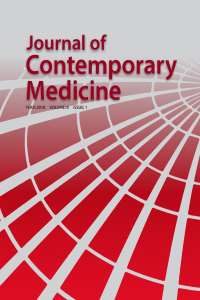Beta Talasemi Taşıyıcılarında Platekrit, Ortalama Trombosit Volümü ve Trombosit Sayısı Arasındaki İlişki
Talasemi, taşıyıcılık, çocuk, trombosit parametreleri
Relationship between platelet counts, mean platelet volume, platecrit and Beta Thalassemia Carriers
Thalassemia, carriers, child,
___
- 1-Cascio MJ, DeLoughery TG. Anemia: Evaluation and Diagnostic Tests. Med Clin North Am. 2017;101(2):263–284. 2- Mettananda S, de Silva DG. Anaemia in children: are we using the correct prevention strategies?. Ceylon Med J. 2017;62(2):73–76. 3- Yesilipek A, Ertem M, Cetin M, et al. HLA-matched family hematopoetic stem cell transplantation in children with beta thalassemia major: The experience of the Turkish Pediatric Bone Marrow Transplantation Group. Pediatr Transplant. 2012;16(8):846-51. 4- Bessman JD, Gilmer PR, Gardner FH: Use of platelet volume improves detection of platelet disorders. Blood Cells 1985;11:127–135. 5- Weatherall DJ, Clegg JB. Inherited haemoglobin disorders: an increasing global health problem. Bulletin of the World Health Organization. 2001;79(8):704–12. 6- Giambona A, Passarello C, Renda D, et al. The significance of the hemoglobin A(2) value in screening for hemoglobinopathies. Clin Biochem. 2009;42(18):1786-96. 7- Kadikoylu G, Yavasoglu I, Bolaman Z, Senturk T. Platelet parameters in women with iron deficiency anemia. J Natl Med Assoc 2006;98:398–402. 8-Dan K. Thrombocytosis in iron deficiency anemia. Intern Med 2005;44:1025–1026. 9-Akan H, Guven N, Aydogdu I, Arat M, Beksac M, Dalva K. Thrombopoietic cytokines in patients with iron deficiency anemia with or without thrombocytosis. Acta Haematol 2000;103:152–156. 10- Mettananda S, Paranamana S, Fernando R, Suranjan M, Rodrigo R1, Perera L, Vipulaguna T, Fernando P, Fernando M, Dayanath BKTP, Costa Y, Premawardhena A. Microcytic anemia in children: parallel screening for iron deficiency and thalassemia provides a useful opportunity for thalassemia prevention in low- and middle-income countries. Pediatr Hematol Oncol. 2020 May;37(4):326-336. 11- Labib HA, Etewa RL, Atia H. The hypercoagulable status in common Mediterranean β-thalassaemia mutations trait. Int J Lab Hematol. 2015 Jun;37(3):326-33. 12- Cikrikcioglu MA, Celik K, Ekinci I, Nasifov M, Toprak AE, Cetin G, Genc S. Mean Platelet Volume in Heterozygous Beta Thalassaemia. Acta Haematol. 2017;137(2):100-105. 13- Levin J, Bessman JD. The inverse relation between platelet volume and platelet number. Abnormalities in hematologic disease and evidence that platelet size does not correlate with platelet age. J Lab Clin Med 1983;101:295–307. 14- Centers for Disease Control and Prevention. Recommendations to prevent and control iron deficiency in the United States. Centers for Disease Control and Prevention. MMWR Morb Mortal WklyRepRecomm Rep. 1998;47:1–29. 15- Subramaniam N, Mundkur S, Kini P, Bhaskaranand N, Aroor S. Clinicohematological study of thrombocytosis in children. ISRN Hematol. 2014 Jan 29;2014:389257. 16- Galanello R, Origa R. Beta-thalassemia. Orphanet J Rare Dis 2010; 5: 11. 17- Kiss TL, Ali MA, Levine M. et al. An algorithm to aid in the investigation of thalassemia trait in multicultural populations. Archives of pathology & laboratory medicine. 2000;124: 1320–1323. 18- Park MJ1, Park PW, Seo YH, Kim KH, Park SH, Jeong JH, Ahn JY. The relationship between iron parameters and platelet parameters in women with iron deficiency anemia and thrombocytosis. Platelets. 2013;24(5):348-51. 19- Nagai T, Komatsu N, Sakata Y, Miura Y, Ozawa K. Iron deficiency anemia with marked thrombocytosis complicated by central retinal vein occlusion. Intern Med 2005;44:1090–1092. 20- Kuku I, Kaya E, Yologlu S, Gokdeniz R, Baydin A. Platelet count in adults with iron deficiency anemia. Platelets 2009;20: 401–405. 21- Holbro A, Volken T, Buser A, et al. Iron deficiency and thrombocytosis. VoxSang. 2017;112(1):87–92. 22- Beguin Y. Erythropoietin and platelet production. Haematologica. 1999;84(6):541–547. 23-Morris VK1, Spraker HL, Howard SC, Ware RE, Reiss UM. Severe thrombocytopenia with iron deficiency anemia. Pediatr Hematol Oncol. 2010 Aug;27(5):413-9. 24- Perlman MK, Schwab JG, Nachman JB, Rubin CM. Thrombocytopenia in Children with Severe Iron Deficiency. J Pediatr Hematol Oncol. 2002 Jun-Jul;24(5):380-4. 25-Gross S, Keefer V, Newman AJ. The platelets in iron-deficiency anemia. I. The response to oral and parenteral iron. Pediatrics 1964;34:315–22. 26- Jagroop IA, Mikhailidis DP. Mean platelet volume is a useful parameter: A reproducible routine method using a modified Coulter thrombocytometer. Platelets 2001;12:171. 27- Park Y, Schoene N, Harris W. Mean platelet volume as an indicator of platelet activation: Methodological issues. Platelets 2002;13:301–306. 28- Gasparyan AY, Ayvazyan L, Mikhailidis DP,Kitas GD: Meanplateletvolume: a link between thrombosis and inflammation? Curr Pharm Des 2011; 17: 47–58. 29-Chandra H, Shrivastava V, Chandra S, Rawat A, Nautiyal R.Evaluation of Platelet and Red Blood Cell Parameters with Proposal of Modified Score as Discriminating Guide for Iron Deficiency Anemia and β-Thalassemia Minor. J Clin Diagn Res. 2016 May;10(5):EC31-4. 30- Tvedten H, Lilliehook I, Hillstrom A, Haggstrom J. Plateletcrit is superior to platelet count for assessing platelet status in Cavalier King Charles Spaniels. Vet Clin Pathol 2008;37:266–271.
- Yayın Aralığı: Yılda 6 Sayı
- Başlangıç: 2011
- Yayıncı: Rabia YILMAZ
Çiğdem ÖZDİLEKCAN, Eşref Oğuz GÜVEN, Fahrettin GÜVENİR, Eda KARAİSMAİLOĞLU
Hülya DEVECİ, Zeliha Cansel ÖZMEN
Basit Bir Tam Kan Sayımı Gestastonel Diyabetes Mellitusu Öngörebilir Mi?
Pelin AYTAN, Seyran BOZKURT BABUŞ, Özde SAKARYA, Revan Sabri ÇİFTÇİ, Hakan AYTAN
ÇOCUKLARDA İLEUSUN NADİR NEDENİ TRANSMEZENTERİK İNTERNAL HERNİ; OLGU SUNUMU
Tamer SEKMENLİ, Nevin SEKMENLİ
Radyolojik Olarak Nekrotizan Pnömoni ve Apseyi Taklit Eden İntralober Sekestrasyon
Yenidoğan Yoğun Bakım Ünitesinde Akut Periton Diyalizi Kullanımı ve Sonuçları
Nuriye EMİROĞLU, Hüseyin ALTUNHAN
Obstrüktif Uyku Apne Sendromunda Sol Ventrikül Kitlesi ve Diyastolik Fonksiyonlar
Yücel YILMAZ, İsmet SARIKAYA, Namık ERYOL
Sağlık Çalışanlarının İnfluenza Aşısına Yaklaşımı
Dilek TEZCAN, Seyfettin ÜSTÜNSOY, Göksal KESKİN, İrem BİLGETEKİN
